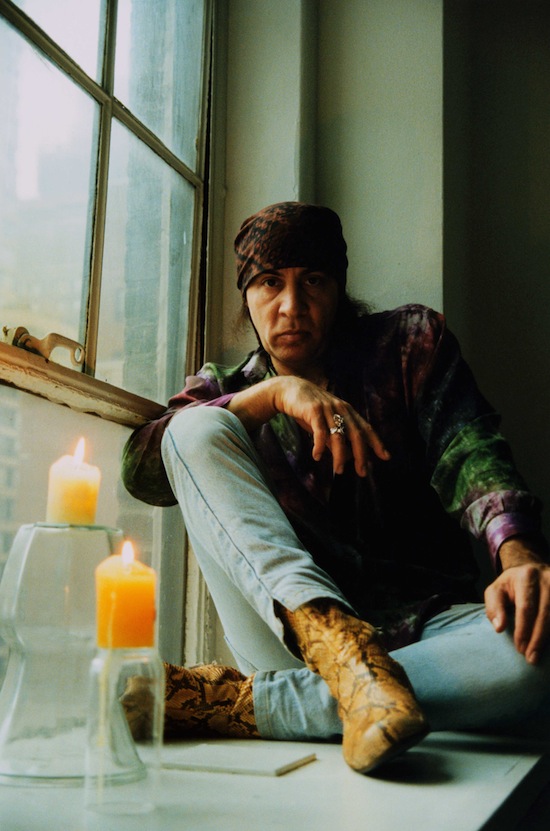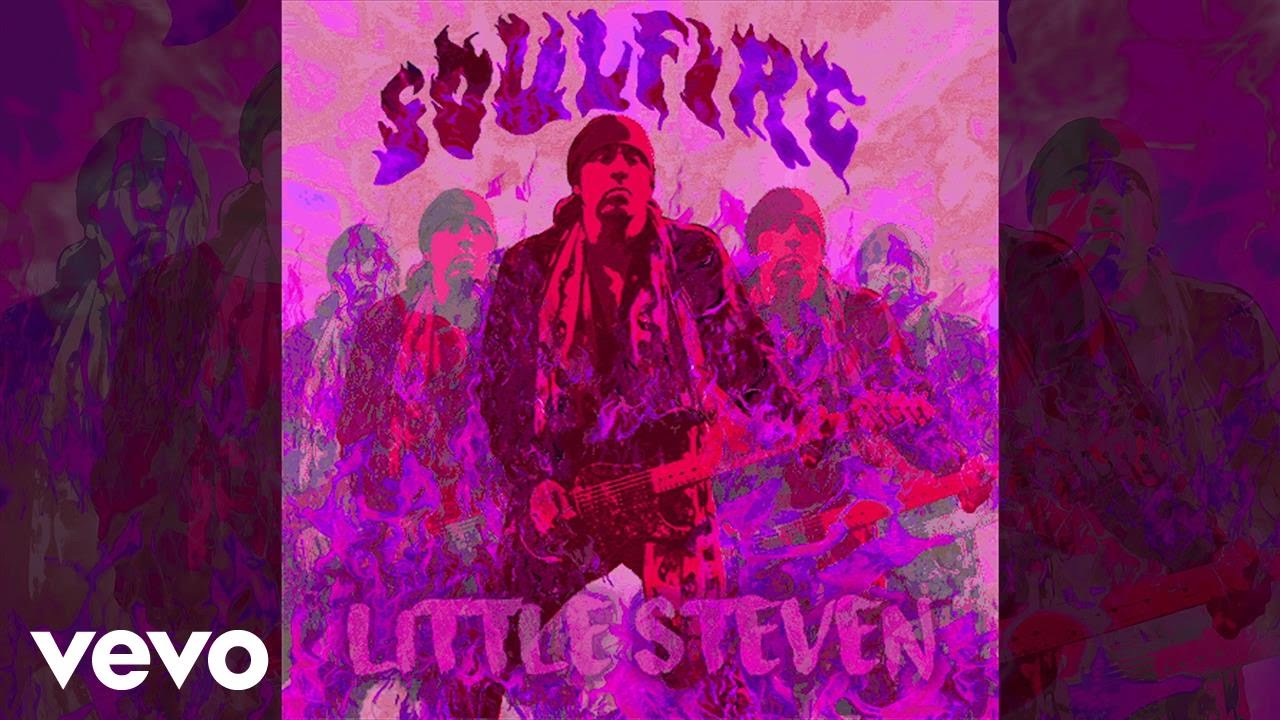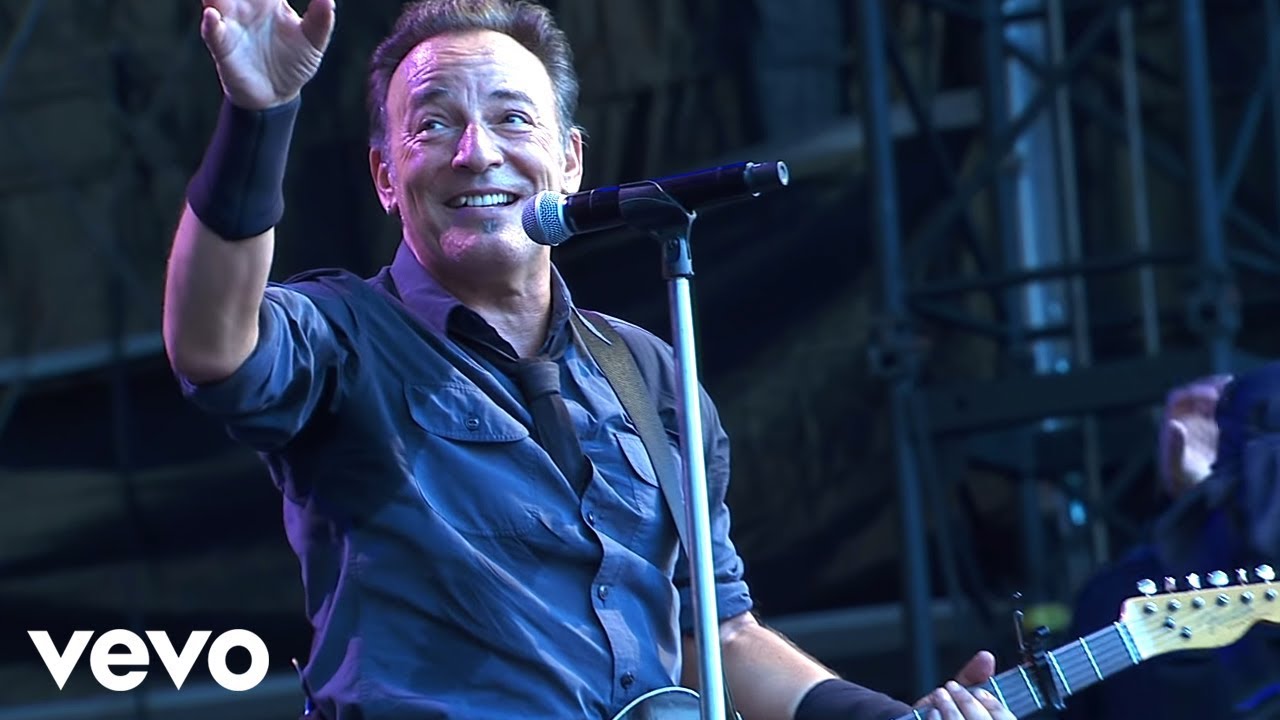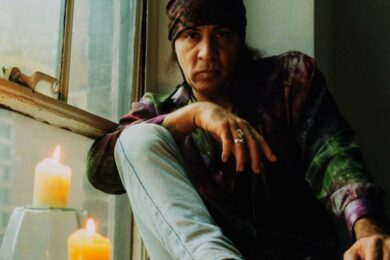One of the most intriguing things about the older generation of rock & roll stars is the sense that they live not just in a different world, but a whole different galaxy. That sense doesn’t come from stories of drugs and sex and lost decades – there are still plenty of young musicians aspiring to those things – but from the cultural forces that shape them.
Take Stevie Van Zandt – actor, producer, newly reminted solo artist and longterm musical consigliere to Bruce Springsteen. A while back, BBC4 showed a documentary called Glad All Over: The Dave Clark Five And Beyond. It began with an array of music’s great and good offering their thoughts on the architects of and sole known representative of the “Tottenham Sound”. Elton John counted them as one of the the big three British 60s bands, alongside the Beatles and the Stones. Paul McCartney spoke about how cool they were. Stevie Wonder rhapsodised about them. And Van Zandt and Springsteen hailed the wildest, most exciting band in rock music.
So, Stevie Van Zandt: the Dave Clark Five? Are you sure about that, mate? Because, frankly, they’re best known at this point for ‘Glad All Over’ being sung by Crystal Palace fans before games. Van Zandt laughs hard. “Well …” He laughs again. “I don’t know what to tell you except listen to the records. They’re some of the greatest records ever made, right there at the very top. Literally nobody was better as far as the productions go. They also had one of the greatest lead singers ever. I don’t know how anybody could miss that – Mike Smith was phenomenal. The individuals were great. The songs were great.”
Honestly, Stevie, they weren’t. The Dave Clark Five were plodding, boring and utterly without swing. “I don’t have any idea how you could hear that. Not very swinging? There are ten great records at least! It must be a cultural thing.”
OK. We’ll leave the Dave Clark Five alone. No point dwelling on them, because we’re never going to agree (and I’m right). Stevie Van Zandt is talking because he’s got a new solo album, Soulfire – a collection of re-recordings of songs from his previous albums, some covers, and a couple of old songs he had never quite finished. Obviously, it would be normal procedure to ask him about it, but the label don’t actually get the record to me until ten minutes before we speak, so that’s out. Van Zandt is displeased. “You need to digest it as an album if you want to talk about how it was intended,” he insists.
Then let’s talk around it. This is only his sixth solo album, and his first for 18 years. How come his solo career is so sporadic? “It’s a good question, and I don’t really have an answer. When I first made solo records, I was managing myself. I was never a businessperson, so it became quite tedious. And at the same time I produced the records, and all five of them are very very different. They’re almost five entirely different genres, which is not the way to have a career. It’s silly. So I was letting the artist in me be the producer, and that’s always a mistake. The only exception to that rule in the whole world that I can think of is Prince. He’s the only guy I can think of who did everything himself and it worked. So I wasn’t making it easy on myself. And management is boring. So I walked away from it, got into acting, and then Bruce starts touring again. And before you know it 20 years [have gone] by. I can’t honestly give you an excuse.”
The thing is, though, that Van Zandt is not a conventional sideman. He doesn’t just stand in the shadows doing as he is told. He joined Springsteen’s E Street Band after stepping in during the recording of Born To Run, to offer an arrangement for the horns on ‘Tenth Avenue Freeze Out’, and he’s produced for Springsteen, and offers forthright opinions on what his boss should do (more pop songs, less browbeating, generally). As producer and writer for Southside Johnny And The Asbury Jukes, he developed a hybrid of rock & roll and soul that Johnny bartered into a career. He corralled the cream of the US music industry into participating in an anti-apartheid single, Sun City, in 1985. He’s a longstanding DJ, with his Underground Garage show on satellite radio. He’s acted, memorably as Silvio, the mafia henchman in The Sopranos and then – no typecasting here – as a mobster exiled to Norway in Lilyhammer.
Is he more comfortable, then, being just a little off to the side, but not completely in the background? “Yes. Because my records are all very political, very personal, I felt I had to come out front in the 80s. But I never had any need to be out front. I think to have a great career as a frontperson, you have to have a need for that, you have to have an ambition for it. I just never did. I couldn’t care less about being in the spotlight. In fact, I didn’t like it really, I didn’t like the extra attention. You slowly start to realise you’re either a star or you’re not. There’s not a lot in between. I realised that when I did Lilyhammer: ‘Oh, it’s good to be the star! It’s good to be the boss, I get this now. Instead of me waiting for them, they’re waiting for me.’ I kind of get it now, very late in life.”
Van Zandt thinks that back in the 80s, when he was away from the E Street Band – he left in 1984, rejoining for good in 1999 – he was a more demanding bandleader than his previous employer. When he went on the road with his backing band, the Disciples Of Soul, he insisted on taking a portable gym with him, and all the musicians were given a mandatory exercise programme.
“It was a form of rebellion,” he says. “At that point, everyone had gone as far as they could with drugs and drinking and gotten as dissipated as they possibly could. We were taking the whole artform and saying, ‘It’s not just sex drugs and fucking around, let’s take more of a disciplined approach to this.’ So we had uniforms made. There was no such thing as a gym in a hotel then, so we’d put all the gym equipment into the bus, and we’d turn one of the hotel rooms into a gym. And we’d work out.”
And how did the band feel about it?
“It was part of the deal: here’s what I’m doing. Do you want in or not? And everybody got into it. A few years later, when gyms started popping up in hotels, that’s when I stopped doing it. It was fun for a while, and different. We were out there with a mission, and we had that disciplined mission to kick ass every night. The extra endurance was necessary for the horns, because I was putting the horns through paces that no one had ever done before. I was really doing rock & roll horns, blowing their brains out every single song. It was challenging physically, so I think the working out made sense.”
He thinks, too, that musically he is more demanding than Springsteen. “I’ve always been more about musical detail than he is,” he says. “Over the years he’s become a better and better producer, a better and better arranger. But I was always the arranger and the producer from day one, really focussed on the details – each sound, each instrument, what it’s doing, every single detail. I’m a bit more detail oriented, I think. We’ve got quite close to the same talent, but I think I was most helpful in the early days as a collaborator because of my arrangement talents. And then my production style, which was band-oriented. There’s a solo thing and there’s a band thing. And he kind of walked that line. Some of these records are one way, some are the other way. But by the time he asked me to coproduce The River, it was because it was time to make a band album. That’s my expertise. That’s what I do. The River sounds different to everything he’d done before, and everything he’d done after.”
Van Zandt takes a very pragmatic view of the music industry. He’s romantic about the golden age of rock & roll, a “renaissance” he dates from 1951 to 1971 (“It’s my religion. It’s everything. Whatever purpose religion has for people, that’s the purpose rock & roll has for me”). But he’s been around long enough – and, one might suggest, made enough money – not to take a kneejerk view of the evils of the major corporations, without which Springsteen – and, by extension, he – would not have had a 40-plus-years career. If he were a young musician starting out today, he’d still sign with a major because they still have the muscle to get their musicians noticed, even if they spend less doing so now than they did back when Springsteen was being pushed upon the world. He doesn’t resent the advent of 360 degree deals, whereby labels take a portion of the revenue from live music and merchandise, as well as from sales of recorded music.
“I think that’s totally fair,” he says. “I’ve always argued against the conventional wisdom that all those artists in the 50s and 60s got ripped off. To his dying day, Chuck Berry was so pissed off about it – ‘The contracts should have been more fair, they should have been more transparent’ – but the fact is, whatever they ripped off didn’t compare to making these artists famous for the rest of their lives. Chuck Berry put $10,000 in cash in that guitar case five nights a week for 50 years. Add that up. The Chess brothers did not steal that much, you know what I’m saying? I tried talking to him a few times, but he didn’t want to hear it. As opposed to Little Richard, who was very philosophical about the whole thing: ‘So what? What did they steal? A hundred grand? Two hundred grand? A million dollars? Whatever they stole, I made 10 times that, 100 times that, and they made me famous.’ What’s that worth? That’s worth a lot. Making somebody famous gives you a right to take a piece of the action. If they’re gonna invest in you, you should give them a piece.”
It’s pretty much impossible to talk to Van Zandt without the subject of Springsteen coming up repeatedly. One doesn’t need to ask about him – Springsteen seeps into the answers. That’s to be expected, really. The pair were friends for years before Van Zandt joined the E Street Band as Miami Steve, a nickname he was given because he had managed to visit Miami once, a feat that seemed unimaginable to penniless young men on the New Jersey shore. Going on tour with the E Street Band feels like a holiday, he says (“You start feeling guilty: I’m not really doing any work here – this is the reward for the work. It’s obviously more work if you’re the frontman, but for me with Bruce it’s a fucking vacation: my brain shuts off’), and he feels more fulfilled working as a producer (“You don’t want to spend too much time on stage because you could argue that at some point you’re cutting into your creative time”).
Nevertheless, even playing stadiums can be a highwire act, especially when Springsteen undertakes his midset harvesting of requests from the audience. There’s a marvellous clip on YouTube, filmed a few years back in Leipzig, of Springsteen accepting a fan’s request for Chuck Berry’s You Never Can Tell. He and the band work out an arrangement on stage, in a full stadium, with Springsteen trying to find a key. He thinks he’s hit the right one, and you see Van Zandt, his eyes widening in horror, because he knows Springsteen won’t be able to reach the high notes.
“We have often played songs to 50,000 or 60,000 people that we have never played before. Never. Not even as kids. That was probably one of them. The TelePrompters now have become part of the infrastructure, and that’s very helpful. I think we played 140 songs on the last tour, as opposed to the Stones’ 18. You can’t do that without TelePrompters. You can maybe remember the music but you’re not gonna remember all the words. It became extra handy when it came to taking requests. You get the request, you send word back to the roadie under the stage, who gets on the computer, finds the lyrics and puts them on the TelePrompter. It’s the only way you can possibly do that. Then it’s a matter of: Does the song have a bridge? You’ll sometimes hear us talking about it. What’s the right key? It makes it fun.”
Of course, having fun on stage after all this time is easier when you and your bandmates aren’t still sharing a van and sleeping three to a room: “That certainly helps. That’s true of any relationship. If you want to stay together for a long time, stay apart. That’s why I’ve been married so long. We’ve been married for 30 years and we’ve been together for 10.”
And that sets him off on a lengthy digression about how to keep a band together. “I hate to say it, but it helps to have a little bit less democracy. In the case of Bruce Springsteen and the E Street Band, he was the boss. Yes, he got lots of input from us, and considered all the input from us, but he made the final decision, and that helps. It also helps to have a really smart manager who understands that he shouldn’t show favouritism, which is rare. Most managers try to separate the lead singer out, or encourage the lead singer to start a solo career. Smart ones don’t do that. They tend to give each member equal respect and make sure they contribute something and make sure they get the credit. It’s all about that – not feeling you’re left out, not feeling you’re ignored. I think if you’re together a long time, a little publishing doesn’t hurt, you know? Just a little bit – give everybody a taste, even though they may not be writing. If you’ve been together a long time and they’re good, they’re probably contributing something to the record. They probably contributing to the arrangements, so give them 5% or something. Give them a little taste. Try and keep the money fairly equitable, and the input as equal as you can, and the credit. The tough thing is the interview, because people only want to talk to the lead singer, maybe the lead guitar player if he’s a cowriter. And the other band members have to accept and understand that. The manager has to insist, wherever possible, that they talk to everybody. But that requires a visionary manager and there are very few of them.”
And if he had to be stranded on a desert island with one member of the E Street Band, who would he choose? He hoots with laughter. “Are you trying to break up my band? I can’t answer that without getting in trouble. You troublemaker, you.”
Soulfire by Little Steven is out now on Wicked Cool Records/UMG





